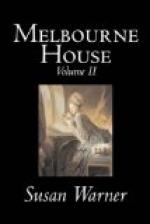The rest of the day was of course devoted to the tableaux. The little company had got warmed to the subject pretty well at the first meeting; they all came together this fine afternoon with spirits in tone for business. And Daisy, though she was tired, presently found her own interest drawn in. She was not called upon immediately to take any active part; she perched herself in the corner of a couch and looked on and listened. Thither came Nora Dinwiddie, too much excited to sit down, and stood by Daisy’s elbow. They had been practising “Alfred in the neat-herd’s cottage;” Nora had been called upon to be the girl blowing the burnt cakes; she had done it, and everybody had laughed, but the little lady was not pleased.
“I know I look horrid!” she said to Daisy,—“puffing out my cheeks till they are like a pair of soapbubbles!”
“But soapbubbles are not that colour,” said Daisy. “Your cheeks didn’t look like soapbubbles.”
“Yes, they did. They looked horrid, I know.”
“But the picture is so,” urged Daisy quietly. “You want to be like the picture.”
“No I don’t. Not that picture. I would like to be something handsome. I don’t like that picture.”
Daisy was silent, and Nora pouted.
“What are you going to be, Daisy?” said Ella Stanfield.
“I am going to be Priscilla. No, I don’t know whether I am or not; but I am going to be Fortitude, I believe.”
“That’s pretty,” said Ella. “What else? O, you are going to be the angel, aren’t you? I wonder if that will be pretty. It will be queer. Nora, shall you like to be one of the little princes in the Tower? with that featherbed coming over us? But we shall not see it, I suppose, because our eyes have got to be shut; but I shall be afraid every minute they will let it fall on us.”
“My eyes won’t be shut,” said Nora.
“O, they must. You know, the little princes were asleep, when the men came to kill them. Your eyes must be shut and you must be asleep. O, what are they doing to Theresa?”
“Dressing her—” said Daisy.
“What is she going to be?”
“Portia—” said Daisy.
“Isn’t that beautiful!—” said Nora with a deep breath. “O, what a splen—did dress! How rich-looking it is. What a lovely purple. O, how beautiful Theresa is in it. O—! Isn’t that splen—did?”
A very prolonged, though low, breath of admiring wonder testified to the impressive power, upon the children at least, of Theresa’s new habiliments. The purple brocade was upon her; its full draperies swept the ground in gorgeous colouring; a necklace of cameos was bound with great effect upon her hair; and on the arms, which were half bare, Mrs. Sandford was clasping gold and glittering jewels. Theresa threw herself slightly back in her prescribed attitude, laid her arms lightly across each other, and turned her head with a very saucy air towards the companion figure, supposed to be Bassanio. All the others laughed and clapped her.




